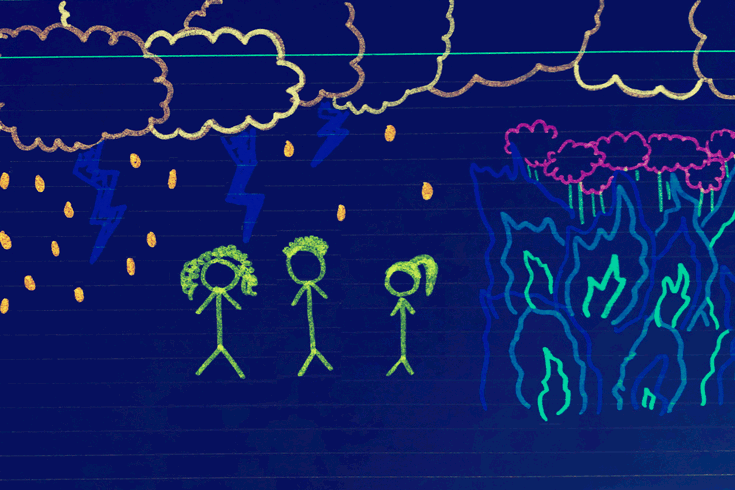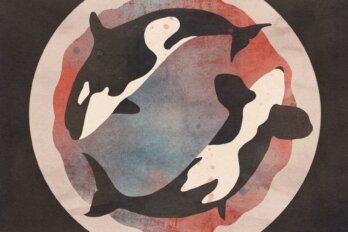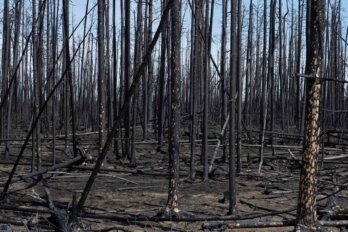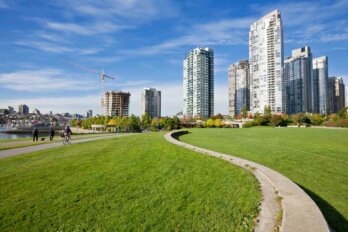The day we got the keys to our new house in California, the so-called Holy Fire was blazing a few kilometres away. The sky rusted a kind of brownish orange, and on the piled boxes and half-dismantled furniture on the patio of our newly purchased home, ashes collected lightly, like dry snow. I had not been sleeping well and did not appreciate this omen. In an effort to embrace a hopeful future, I painted the walls of the living room, listening to a podcast about Nathaniel Rich’s long piece in The New York Times Magazine documenting the tragic moments in the 1970s and 1980s when something could have been done about climate change but wasn’t. Rich said something about the caves we’d all one day be forced to live in if any of us survived. Several times a week, I woke up worrying about how much water we’d use on our new property. It hadn’t rained in months.
This was the fourth fire I’d been close to that year, or maybe the seventh—I lost count. On the campus of the university I attended in Orange, California, I saw a student wearing a gas mask. I drove down the 91 freeway in my little Prius within feet of flames, tasting the smoke as if it were summer camp and I was sitting near a bonfire.
My children are now five years older since we moved from Hamilton, Ontario, to Riverside, California, for my husband’s miraculous job in a precarious academic market. I was the homesick tag-along spouse. We were white Canadians with one American passport between us, and we floated through the costly hoops of getting green cards and have never once been stopped or detained for our immigration status, even while our new home country elected a president on a platform of literal wall-building. We were peace-and-order-and-good-government-indoctrinated Canadians at a time when many Americans thought it cute that I’d never seen a gun. We were parents whose children would learn in classrooms what to do if a shooter arrived. And now, we are the parents of three children who will grow up to face one climate catastrophe after another.
When we arrived in Riverside, and I felt worried about the lack of trees and the proliferation of cars on the road, I remember people telling me that the smog problem had already been solved by government regulation decades ago. That this was nothing. That the air had been nearly unbreathable in the 1970s. I heard this so many times it began to feel like I was in a dystopian novel where smiling, brainwashed people recite a party line. But a friend and lifelong Californian remarked that the air did seem to have gotten worse following Donald Trump’s election. Nearly two years later, a news report came out that our air quality was the worst it had been in years.
I was having trouble with my hope. I was trying to raise children and not go insane, not fall too deeply into feelings of crisis and despair. I had begun working with climate activists and other progressives, organizing protests and gatherings, speaking with politicians and environmental groups, hoping to lend my resources to something meaningful. But I’d burned out fighting and started feeling guilty for the burnout. Fighting felt sometimes like piety rather than action; it felt like saving pennies while your gambling-addicted spouse lost thousands. Things were only getting worse: How could we go on driving to work, driving to school, buying houses, adopting dogs? I was feeling a little hysterical, but, “Here,” David Wallace-Wells writes in The Uninhabitable Earth, “the facts are hysterical.”
I needed a story, badly. I needed someone to tell me the story I needed in order to live. But I needed to be a mother too. And this was knowledge I had trouble bearing: How could I ask my children to know these facts—that we would see unprecedented worldwide hardship and loss in our lifetimes—when I could barely stand to face them myself?
Most parents have strong opinions of what a child should be exposed to, what a child can reasonably be asked to know. One of those parents is my mother, who visited from southern Ontario to help us move into our new house. Arguments between my mother and me flare up like unpredictable weather systems, and on this trip, there was a crackling tension in the air. When she came to the house during the two days I spent painting the living and dining rooms, she overheard snatches of political and literary podcasts, and I remember her worrying they were propaganda.
“I don’t think this is propaganda,” I said, irritated by her assumption. It was a well-researched conversation between thoughtful people. Even so, I had to admit that, when terrible things happened, I did turn toward those who were like minded, gulping leftist rhetoric when I felt despair about mass killings or social injustice.
In an effort to break the tension, I took her for a walk in the new neighbourhood and we admired the cactus gardens, the pink bougainvillea, and the sharp orange-tipped faces of the birds of paradise. I gestured at this prettiness and we agreed that my family had found a nice corner of Riverside. But then I ruined things by provoking her.
“None of this will be here in thirty years,” I said.
My mother grumbled that I had chosen to live in California and that she was having a lot of trouble with my negativity.
“Things aren’t the way they were for you when you were settling down,” I said. “How are we supposed to make any decisions about the future? All of this could just disappear.”
She thought I was being hysterical; I thought I was being realistic. In a way, we were just pacing through a generational argument.
“You shouldn’t mention it so much in front of the girls,” she said. “You are stressing them out.”
I had been weaned on the difficult ideas of heaven and hell, on God’s inscrutable wisdom. Were the Christian end times I was taught to look forward to less emotionally damaging than the real ones we are now facing? My husband, Adam, remarked that the Christian apocalypse might not seem as frightening as the climate crisis because the former appears to have a solution. You might escape the worst of it through religious devotion or even mere adherence, unless you were raised Calvinist—as I was—in which case it was hard to act knowing that not even your own righteousness could save you.
Three kids in five years was almost more than I could handle psychologically. It’s also a lot to ask the world to bear: three middle class North American kids produce far more waste and cause more emissions than are their share. As well as the burden on the environment, parents face the moral burden of bringing our children into a world facing an enormous crisis and asking them, too, to carry it. As Colorado-based writer Alexander Lumans puts it, “When you have a child, in a sense you say to your child, ‘Alright, here’s the world.’”
What story can we tell our children to help them face the world they will inherit? David Wallace-Wells refers to the despair and anxiety many environmental scientists now live with. He calls this “toxic knowledge,” quoting Richard Heinberg of the Post Carbon Institute: “Once you know about overpopulation, overshoot, depletion, climate change, and the dynamics of social collapse, you can’t unknow it, and your every subsequent thought is tainted.” Greta Thunberg’s unrelenting reaction to this knowledge is maybe the only reasonable one. Act as though the house is on fire, she tells us, because it is.
Once, at a small gathering, my then eight-year-old daughter Simone overheard us talking and suddenly looked up from what she was reading to say: “People aren’t good. Everyone knows that.” Every parent builds the world for their children, and many have had the surprise of finding out what they believe when they hear it coming out of their children’s mouths. Maybe we had played too much Leonard Cohen, or too much of that one Nick Cave song on the Shrek 2 soundtrack, or just talked too openly about how little we understood death.
Many parents I know worry about the climate crisis seeping into their relationships with their children. Sarah Stewart-Kroeker, a scholar now raising two small children in Switzerland, tells me that she tries “not to let the apocalyptic scenarios dominate my emotional life with [my children].” My friend Niranjana Iyer’s twelve-year-old son knows, from his science classes, that “climate change needs to be reversed.” My own daughters bring up their worries and sorrows to me unprompted: we were on the way home from an errand when Simone, now ten, told me sadly that, if we as a family got to zero emissions but no one else did, it might not make any difference to the planet.
Thunberg, at seventeen years old, is the most visible of the young climate activists, but new climate groups like the Sunrise Movement and Zero Hour are also being led by young people. Millions of young people have participated in global climate strikes. I recently saw Zero Hour’s eighteen-year-old founder, Jamie Margolin, speak at a rally; it’s clear that people under twenty are already living with toxic knowledge and dread. I wanted to know how ordinary teenagers were handling things outside of Europe and North America, so Niranjana connected me to Ananya Garg, a high school senior in Singapore who sent me a photo of a “die-in” protest held at her school. This toxic knowledge is scientific knowledge. It is political and moral knowledge. It is precisely the kind of thing people are supposed to teach their children, though usually in ways easier to manage than this.
Some people handle the hugeness of the situation—and our overuse of resources—by choosing not to have children at all. Journalist Katie O’Reilly writes about “reproductive anxiety” for the Sierra Club: “Like the threat of nuclear annihilation, climate change demands a reckoning of everything we’ve been conditioned to believe about security and the future.” In a Guardian article from 2017, having children is listed as the most damaging “lifestyle choice” in the fight against climate change.
The decision about whether to have children, when it’s available, is never easy. For me, the question, until it was answered, was, like the question of God’s existence, persistently on my mind. At that time, from 2006 to 2007, the question seemed far more personal than global: How was I going to have children and finish my PhD? How was I going to be a writer and make enough money to support them? I was a little worried about climate change, but it seemed far away, perhaps even preventable when people in power finally woke up.
Like many lifestyle choices—going vegetarian, flying less, avoiding straws—not having children can distract us from need for large-scale political change. We often behave as though it is our mere existence—as though people aren’t any good—and not our total mismanagement of resources that keeps us from solving this problem. As Wallace-Wells, among many others, points out, we already have the “tools we need to avoid catastrophic climate change—even major climate change.” What we lack is political will.
Now, I try to find the balance by taking my daughters to protests and politicians’ offices. Other times, I leave them at home. I want them to know enough that they’re informed, but I don’t want them to suffer my insomnia just yet. Adam and I parent the way we always have: by throwing ourselves headlong in what seems like the right direction. We have always prioritized not lying to our children, but we share the truth with them hopefully, urging them to remember what it feels like to love others and to love this world.
When I was a teenage upstart in my Christian community, I was encouraged in ways both subtle and overt to get married—which would, our community hoped, lead to children. We joked that the Christian college was where you got your “Mrs.” degree, and an elder in my congregation asked me how I was going to find a good Christian husband at a secular university. But I clung to a passage from one of Paul’s epistles in which Paul argues against family life. It is better for followers of Christ to stay unmarried, as he does, Paul writes, unless they can’t control themselves and burn with lust. Paul couldn’t have lived as he did, moving from place to place without belongings, preaching and getting thrown in prison, if he had a family. A family demands resources and focus, things that may be better spent on one’s important mission. While that kind of devotion is amazing, the climate fight doesn’t need everyone to be zealot—what a terrible world that would be. When you begin, like a saint or a technocrat, to believe that our embodied, material lives don’t matter—when you get too focused on your mission—you might wind up with less motivation to do the work. Nothing anchors you to reality like love and community and people who depend on you. This doesn’t have to happen via child-bearing, obviously, but for me it did. I coasted around, more spirit than flesh, more mind than body, until I held my first child to my breast.
Perhaps because of my underlying mental health struggles, perhaps because of my scripture-focused upbringing, I seem to be in constant need of models for living meaningfully. When in crisis, when in love, when grieving, when ambitious, when a new parent, I look to stories for help. Having children was why it became essential to find a story, to find a reason to live. Without my family, I would have much more time on my hands to go to rallies and agitate politicians, but I am badly prone to nihilism, and, to be honest, that other version of myself might have done much less with my energy and rage. I don’t care that much if my children go to college, because I can’t imagine what the world will look like as society begins to fray. I don’t care if they make any money. I don’t care if they get married or have children of their own. I care that they learn how to be invested in this life and take care of others and that they care enough to fight for all of us.
My friend Katy Gurin, a poet, engineer, and environmental activist, learned how to put outrage to use by witnessing her mother’s participation in protests. When Gurin was a small child, she and her mother watched an ancient forest being logged beyond repair: “I was nine years old and I was super angry, like really, really, deeply angry.” I asked her whether she’d ever wished her mother had protected her from this sort of knowledge, and Gurin says that she never felt that any of her mother’s beliefs were imposed on her. “I was grateful to her for showing me how to be an activist.”
Anger can be a form of love. So argues Myisha Cherry, a philosopher of emotion. When I’m angry about injustice, angry on behalf of others, I am my best loving self. So I’m not going to apologize for my anger about the enormity of this problem. I’m going to listen to my children when they express their fear or their rage, then I’m going to help them use it.





